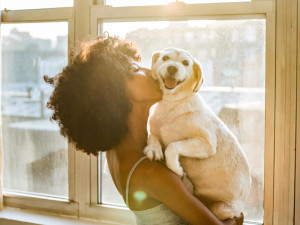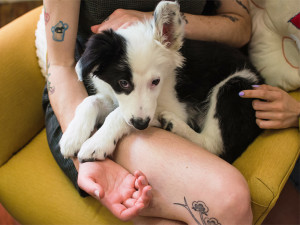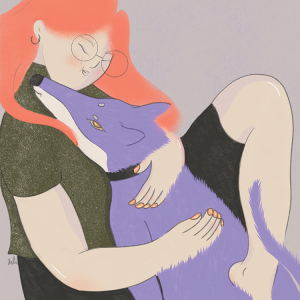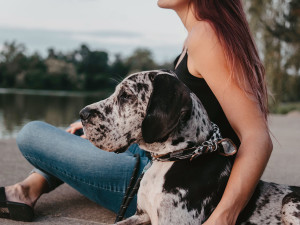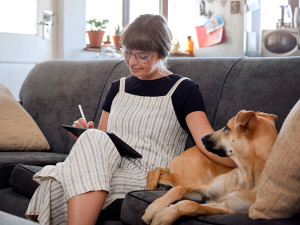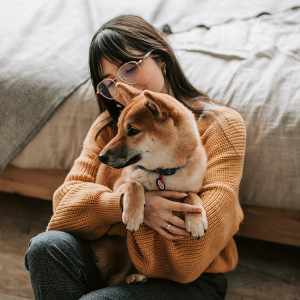Are You a Helicopter Dog Parent?
It’s normal to worry—but your pup might need some space.
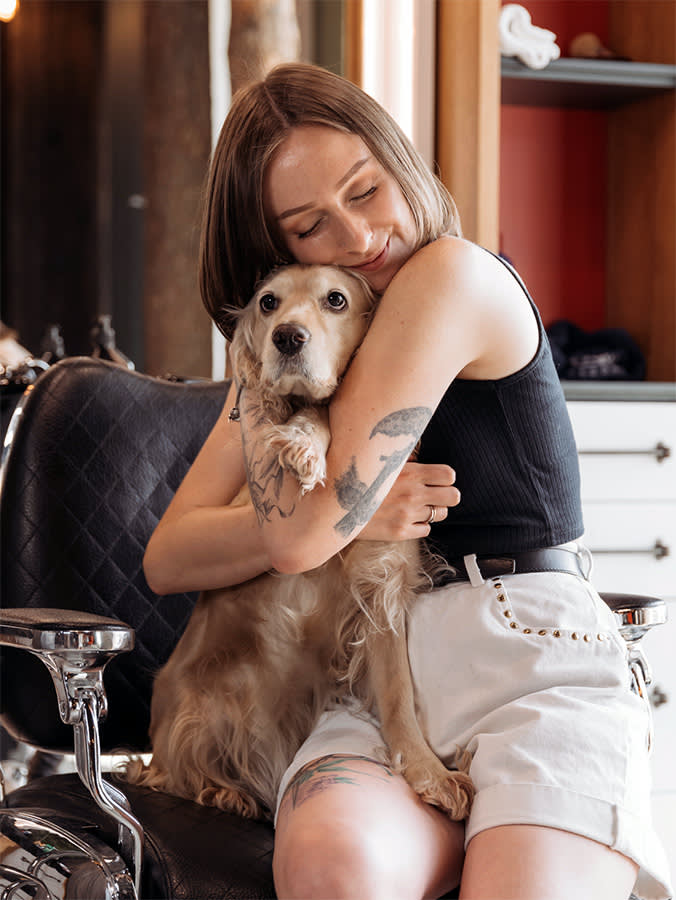
Share Article
If you could see my search history, you’d probably be worried. About me, not my dog. In the past couple days alone, I have asked the internet whether my dog’s eye gunk is a normal color, if she will be emotionally scarred from having to poop in the snow, and whether she thinks I’m her mom or her wife. (Yes, no, and both.)
If my dog were a human child — which, in many ways, she is — I’d be teetering on the edge of helicopter parenting. This type of parent is typically characterized by being overly attentive, excessively cautious, Googling questions like “best everyday body armor for kids,” and general hovering. Understandably, this level of parental hyper-vigilance comes with a stigma.
What’s the link between helicopter parenting and mental health?
Last year, a team of Norwegian researchers reviewed 38 different studies focused on helicopter parentingopens in new tab and symptoms of anxiety and depression. They found that a majority of these studies suggested a relationship between helicopter parenting and anxiety/depression, though they noted the evidence is “insufficient” and needs to be investigated further.
In 2018, a study from the American Psychological Association opens in new tab found that toddlers who experienced “over-controlling” parentingopens in new tab at age two had poorer behavioral and emotional regulation at age five. Alternatively, children who exhibited stronger emotional and behavioral regulation at age five were less likely to have social or emotional issues at age ten. The same year, the New York Times published an article on parents helping versus “helicoptering”opens in new tab their children, asking questions like, “Are we abetting dependency?” and “Can we allow our child to be uneasy?”

Often, it starts from a place of love. We want the ones we care about to be safe, healthy, and happy — pets included. In turn, it’s all too easy to let legitimate concerns grow to full-blown panic. If this sounds familiar as a fellow pet parent, fear not. (Er, fear less.) Here’s what you need to know about helicopter parenting your dog.
What is a helicopter pet parent and am I one?
There is no definitive test to determine whether you’re a helicopter parent (for children, dogs, or otherwise). This is great news if you’d prefer to panic in peace but not so helpful if you’re trying to ease your own anxieties. Fortunately, I spoke to a couple of experts who offered insight into what helicopter parenting could look like for pet parents.
“In my experience, helicopter dog parenting often manifests as jumping to the worst possible conclusion about your pet,” Margaret, an animal shelter educator in the Kansas City, Missouri, area, tells me. She used the examples of rushing to the vet because you’re worried your dog yawns too much or assuming that if your dog growls at one (one) stranger, you’ll never be allowed to take them in public again.
Margaret continues: “As a self-confessed helicopter dog parent myself, I am constantly going over my girls with a (sometimes literal) fine-toothed comb in order to look for new bumps and bruises.” Even the professionals do it!
Robert Haussmann, a certified professional dog trainer, behavior consultant, and Kinship Collective member, says he often sees helicopter pet parenting manifest as over policing a dog’s innate instincts.
“Many clients over-police their dog’s ability to sniff and explore because they are so concerned about what the dog may eat,” he says, noting that this kind of concern is understandable after you’ve “pulled the fourth mystery tissue out of your dog’s mouth.” But, he adds: “Sniffing and exploring is crucial to a puppies development and an adult dog’s quality of life.”
OK, I’m a helicopter dog parent. Does this mean I’m a bad person — I mean pet parent?
There are studies that suggest anxious pet parents tend to have anxious dogs. But like the studies with human helicopter parents, the findings aren’t conclusive, nor are they causational. Like most things in life, the key is striking a balance between your own caution and your dog’s curiosity.
“I think it’s great when people are hyper aware of their dog's well being,” Haussman says, noting that dog’s lives are enriched by parents who research diet, engage in exercise, encourage mental stimulation, and the like. “It can go off the rails however when people micromanage their dogs ability to explore or socialize,” he continues, adding that it’s important to let dogs “navigate the rich tapestry of canine social communication.”
As someone who works in an animal shelter, Margaret sees plenty of positives in “helicopter” pet parenting. “I would much, much rather someone err on the side of over-attentiveness rather than the side of indifference or cruelty,” she says, noting that being hypervigilant could help you catch early signs of illness or keep your pet from, say, eating something they shouldn’t. “You may get the occasional eye roll from your mother who wanted human grandchildren,” she continues. “But so be it.”
How do I…not do this? Or, at least, do it a little less?
If you’re concerned about helicopter-parenting your pet, Haussman recommends working with a professional trainer. “New dog owners especially benefit from learning what is normal behavior and when to be concerned,” he says.
Margaret offers some basic questions pet parents can ask themselves as a gut check: Does your dog have consistent access to good food and clean water? Does your dog have a comfortable place to rest? Does your dog have the space and opportunity to do the things dogs do (run, play, etc.)? Is your dog safe? Does your dog have regular access to medical care? “If the answer to all of the above is ‘yes,’” she says. “Then, your dog is likely feeling happy, healthy, and loved!” And if you have concerns, you can always talk to your vet.
Both experts recommend following your dog’s lead. “Remember that dogs like doing dog stuff,” Haussman says. “Micromanaging, being overly protective or strict can add stress for both you and your dog.”
Above all, what’s most important is having a well-loved pet. For some, that may mean letting your dog explore a little more or, yes, double-checking that blueberries are safe for dogs to eat. (I’ll save you the search: They are.)
References:

Mia Mercado
Mia Mercado is a writer whose work has appeared in The New Yorker, New York, The New York Times, Cosmopolitan, Bustle, and more. She’s also the author of two essay collections, Weird But Normal (2020) and She’s Nice Though (2022), both published by HarperOne.
Related articles
![Illustration of a woman hugging a dog]()
Your Dog Can Smell When You’re Stressed, New Study Says
Research finds that your pup can smell when you’ve been doom-scrolling, and they get bummed out.
![Valentin Pujadas illustration]()
FYI, Pets Are Incredibly Good For Your Mental Health
Experts share the science-backed ways our pets offer us emotional support.
![A woman sitting with her arm around a dog enjoying a view of water.]()
How to Cure Your Dog’s Case of the Everyday Scaries
There’s nothing to fear but fear itself — and a dog who won’t stop shaking when it thunders.
![A woman sitting on a couch with a dog.]()
Does Your Pet Need Therapy?
Dogs and cats can’t read self-help books, so a veterinary behaviorist explains how your pet may benefit from being in treatment.
![Greyhound dog lying on top of couch looking out of a window]()
8 Calming Products That Help My Dog’s Anxiety
Compression vests, interactive toys, and pheromone sprays will be game-changers this Fourth of July.
![A woman wearing a knit sweater holding a dog close on the floor of her bedroom.]()
Separation Anxiety in Dogs
Train your dog to stay calm when they’re on their own — instead of sad-singing “All By Myself” until you come home.
